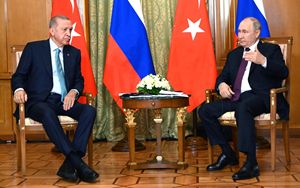(Finance) – No decision on Moscow’s return to the wheat agreement and no progress on the front of the peace mediation process that Turkey would like to resume between Russia and Ukraine. L’expected meeting between Vladimir Putin and Recep Tayyip Erdogan, the first in presence after almost a year, did not produce the desired results. There will be no signing of any document at the end of the talks underway in Sochi between Russian President Vladimir Putin and Turkish President Recep Tayyip Erdogan, Kremlin spokesman Dmitry Peskov told the RIA Novosti agency. The first part of the talks, which lasted an hour and a half, which was also attended by the respective foreign and defense ministers, – Peskov said – was “very constructive” with a “complete exchange of information” and a ” comprehensive analysis of bilateral relations”. In addition to the agreement on wheat, the situations in Ukraine, Syria and Libya are also on the agenda of the talks.
In detail Moscow, Putin reiterated, will accept one resumption of the agreement for the export of Ukrainian cereals only when the restrictions on its export of grain and fertilizers are lifted. For Putin, “the Ukrainian counter-offensive has failed” and there is no concrete prospect of negotiations on the horizon. The Turkish president said that his country has prepared “some proposals together with the UN” that could convince Russia to return to thewheat deal. Indeed, Moscow underlines that with the agreement reached in the summer of 2022 between Russia and Ukraine with the mediation of Ankara and the United Nations, a memorandum was also adopted which provided for the removal of obstacles to exports of Russian cereals, but which has never been applied. While Western sanctions do not directly affect food exports, the restrictions imposed on banking, logistics and insurance create often insurmountable barriers. And this while Russian production – 130 million tons of wheat expected this year, with 60 million that can be exported – according to Putin could make a decisive contribution to combating the food problems of the poorest countries. Among other things, the tsar claimed that exports of Ukrainian wheat in the year in which the agreement lasted, until last July, benefited more than 70% of the richest countries, and only to the extent of 3 % of those in the poorest bracket. In this scenario, Putin accused the Ukrainians of having used the humanitarian corridors reserved for ships in the Black Sea to attack Russian military and civilian targets, including the Turkish Stream and Blue Stream pipelines and the Russian ships deployed to protect them: “This can no longer be tolerated,” he warned. But the Russian leader also seemed to question the need for the agreement, underlining that “wheat prices continue to fall” despite its suspension. “There is not a physical lack of food, but of its equitable distribution”, Putin said, announcing that within a few weeks Russia’s initiative to make free deliveries of cereals to six of the poorest African countries should become operational. Between 25,000 and 50,000 tonnes each should be supplied to Burkina Faso, Zimbabwe, Mali, Somalia, the Central African Republic and Eritrea. “We believe that we will soon be able to reach a solution that meets expectations,” Erdogan assured, commenting on the wheat deal.
Ankara’s goal is to present itself as peace mediator between Moscow and Kiev, and on this Erdogan has invited Ukraine to “soften” its position.
The focus of the three-hour talks in Sochi topics of mutual interest. On the front of nuclear Putin has announced the start-up next year of Turkey’s first power plant built by the Russians in Akkuyu. Erdogan spoke of “steps forward” for the construction of the second at Sinop, on the Black Sea. In the energy field, a working group was also created for the construction of a gas hub in Turkey, fueled by Russian raw materials.
